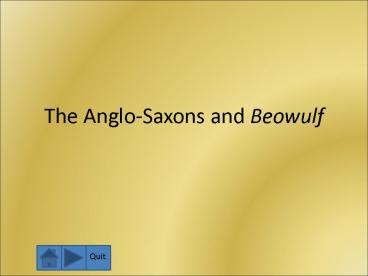The%20Anglo-Saxons%20and%20Beowulf - PowerPoint PPT Presentation
Title:
The%20Anglo-Saxons%20and%20Beowulf
Description:
... .edu/english/fajardo/teaching/eng520/lang-samples-small.jpg Information of the Anglo-Saxon period and of Beowulf Anderson, Rachel. Medieval Context: Beowulf ... – PowerPoint PPT presentation
Number of Views:150
Avg rating:3.0/5.0
Title: The%20Anglo-Saxons%20and%20Beowulf
1
The Anglo-Saxons and Beowulf
Quit
2
Table of Contents
- Anglo-Saxon Era Timeline
- Anglo-Saxon society
- Pagan vs. Christianity
- Anglo-Saxon Literature
- Beowulf
- Resources
- Authors slide
- Concept Map
Quit
3
The Anglo-Saxon Era Timeline
- 43CE Romans invade Britain.
- Encountered the Celts.
- Romans build roads, villas, huge buildings, and
forts. - Introduced Christianity.
- 420CE Romans leave.
4
Timeline Continued
- 450CE Jutes from Denmark, and the Angles and
Saxons from Northern Germany invade England. - 597CE Anglo-Saxons become Christian
Quit
5
Timeline Continued
- 787CE Viking raids begin
- 871-899CE King Alfred the Great becomes King of
England. - Established education systems, rebuilt
monasteries. - Fought Danes and forced them from Wessex.
- Unified Anglo-Saxons under one king to resist the
Viking invasions. - Danes ruled in the North, Anglo-Saxons in the
South. - 1066CE Norman Conquest by William the Conqueror.
- From Norman French.
- Defeated Danes and Anglo-Saxons.
- Officially ended Anglo-Saxon era and brought
about the beginning of the Medieval Period.
Quit
6
Anglo-Saxon Society
- Anglo-Saxon society.
- Lived in tribal groups with a high class of
warriors. - Kings emerged as society developed.
- Spoke Old English. This was the language that
Beowulf was written in. - Became Christian but still valued heroic ideals
and traditional heroes. - Their culture valued human contact, family,
virtue, and a good story. They feared
humiliation and loneliness in their lives. In
addition, the Anglo-Saxons desired richness,
power, and appreciated heroic actions of
warriors.
Quit
7
Pagan vs. Christianity in Beowulf
The Anglo-Saxons mixed both pagan and Christian
traditions. Beowulf contains traces of both
beliefs.
- Pagan
- Christianity
- Strong nature presence
- Strength of the warrior
- God is mentioned by two of the main characters in
the poem Beowulf and Hrothgar. - Grendel as Lucifer
- Both are outcasts
- Perform a task for God
- Grendel is described as a son or descendant of
Cain, a clear Biblical reference.
Quit
8
Anglo-Saxon Literature
- Anglo-Saxon literature began as an oral
tradition. Stories, poems, and songs were all
told aloud and passed from generation to
generation orally through minstrels (also called
scops). - Poems traditionally had a strong beat,
alliteration, and no rhyme. - Caesura a cutting. A break in a line of
poetry, used in Old English to depict a half
line. We use a comma for a modern effect. - i.e. Da com of more under mistheleopum
- Out from the marsh, from the foot of the
hills. - Kenning derived from the Norse word kenna
which means to know, to recognize. It is a
compact metaphor that functions as a name. - i.e. helmberend Helm bearer or warrior
- Old English example
Quit
9
The Epic!
- Beowulf is the most well-known Anglo-Saxon poem,
and is a form of poetry called the epic. Such
other examples are Homers The Iliad and The
Odessey. - Long narrative that celebrates a heros long
journeys and heroic deeds. - J.R.R. Tolkiens The Lord of the Ring series and
George Lucas Stars Wars could be called modern
epics. - Characteristics include a noble hero whose
character traits reflect their societys ideals.
The hero performs brave acts and appears
superhuman.
Quit
10
Heroic Code
- The epic poem Beowulf strengthens the Heroic
Code. This code was derived from the
Anglo-Saxons Germanic roots, and called for
strength, courage, and loyalty in warriors. It
also required kings to be hospitable, generous,
and have great political skills. This code was a
basis for Anglo-Saxon honor.
Quit
11
Common Themes Of an Epic Poem
- Universal themes of epic poetry
- Good vs. evil
- Beowulf vs. Grendel
- Isolation
- Courage and honor
- Beowulf is fearless and brave while fighting the
monsters. - Gods or semi-divine creatures
- Grendel, Grendels mother, the dragon
- Tale involves the fate of an entire race
- Beowulf saves Hrothgars village from Grendel.
Quit
12
Beowulf
- Most famous of early Germanic poems
- Written anywhere between 400-1000, but most
likely after the 500s. - The author is unknown, but likely to be
Christian. It is likely that a few different
authors elaborated on the tale. - Takes place in Sweden, Denmark, and Frisia.
- The Norse were at this time attacking Britain,
thus allowing knowledge of places, people, and
ancestors to be available.
Quit
13
Characters
- Beowulf main character, a hero featuring all the
qualities of an epic hero. He has superhuman
strength and is fearless and brave in battler. - Hrothgar the king of the village that Beowulf
saves from Grendel. - Grendel a monster terrorizing Hrothgars
village. - Grendels mother a monster set out to avenge her
sons death.
Quit
14
Resources
- The Anglo-Saxon Invasions of Britain and The
Spread of Christianity - http//player.discoveryeducation.com/index.cfm?gui
dAssetId1A5DF869-F81A-463A-8E03-495F774C68EFblnF
romSearch1productcodeUS - Life After the Romans
- http//player.discoveryeducation.com/index.cfm?gui
dAssetIdBD1245FC-89CF-4423-A217-E0EBC8FF62A6blnF
romSearch1productcodeUS - Old English sample
- http//mockingbird.creighton.edu/english/fajardo/t
eaching/eng520/lang-samples-small.jpg - Information of the Anglo-Saxon period and of
Beowulf - Anderson, Rachel. Medieval Context Beowulf.
ENG 220 British Literature I. Grand Valley State
University, Allendale, MI. 10 Jan. 2008. - Schneider, Daniel. English Literature
Anglo-Saxon Era and Beowulf. Honors English
Literature. Linden High School, Linden, MI. 30
Aug. 2005.
Quit































